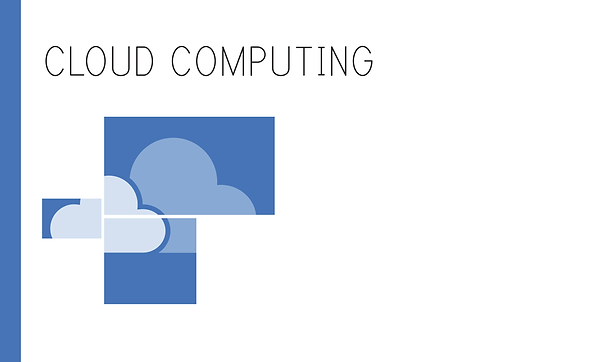


What is Cloud Computing?
Cloud computing functions like an expansive virtual data warehouse capable of storing diverse digital assets such as documents, images, music, games, and more. It transcends geographical limitations by storing these assets not only on local hard drives, phones, laptops, or tablets but also on remote servers. Utilizing internet connections, users can easily share, access, and manage information anytime, anywhere.
“ I don’t need a hard disk in my computer if I can get to the server faster.”
- Steve Jobs at Apple’s WWDC 1997

Just as occasionally glancing skyward unveils drifting clouds,
people's lives seem to be surrounded by something akin to a "cloud" with the advancement of technology, silently yet ever-present.

Embracing a Cloud Lifestyle
Whether downloading LINE, Facebook, Instagram from Google Play or the App Store, generating documents with ChatGPT, streaming videos on YouTube or Netflix, or choosing to upload photos to OneDrive or Google Drive due to storage constraints, all these activities are interconnected with the concept of "cloud computing." This involves leveraging remote server resources for data processing and storage.


As servers connect through networks, they form data centers. These data centers serve not only as "warehouses" to store users' file data but also as "computing centers" to assist users in searching, identifying, or even generating documents.


With the flourishing development of smartphones, e-commerce, streaming, short videos, and social media, there is an increasing flow of information on the internet. This necessitates more servers to participate in various cloud operations such as uploading, downloading, backing up, and searching.


For enterprises, retaining user usage data not only facilitates big data analysis but also opens up possibilities for emerging technologies such as the Internet of Things (IoT), machine learning (ML), and automated recognition. Therefore, to stay abreast of this trend, enterprises must undergo digital transformation, effectively harness cloud services, fully exploit the advantages of cloud computing, and address the challenges of the AI era.
“And you know, in the last 7 years, you know how many times I have lost any personal data? Zero.
Do you know how many times I back up my computer? Zero.”
- Steve Jobs at Apple’s WWDC 1997

With the increasing volume of data, one of the challenges facing enterprises is how to manage massive computational demands. Previously, companies would opt to procure equipment and build their infrastructure, which not only consumed time and effort but also often resulted in significant financial pressure and inadequate overall effectiveness.

Alleviating Enterprise Computational Burden
To address the challenge of inefficient computing power, TTS offers enterprises an efficient, flexible, and cost-effective solution—8. Designed to provide the highest quality computing resources, these services help alleviate computational pressures, enabling clients to concentrate on business development. By eliminating the need for clients to manage computing infrastructure, our solution enables them to achieve superior performance outcomes.

Advantages of High Performance Servers
1
High-Speed Computing Power
Advanced servers come equipped with powerful processors and multiple GPUs, providing exceptional computing performance that accelerates data analysis, simulations, and machine learning tasks.
2
Scalability and Flexibility
With flexible hardware configurations and a range of expansion options, servers are adaptable to specific needs, ensuring optimal performance under various workloads.
3
Stability and Reliability
Enterprise servers feature outstanding fault tolerance, ensuring continuous operation even in the face of failures or unexpected disruptions. Ideal for critical tasks that demand long-duration computations.

4 Key Advantages
01
High-Performance
Computing Resources
We offer advanced computing facilities and technology to provide you with high-performance computing resources. Whether processing large-scale datasets or conducting complex simulations and analyses, our computing resources can meet your needs, ensuring smooth business operations.
03
Cost-Effective Computing Solution
Our computing services adopt flexible billing methods, allowing you to pay for actual usage, eliminating fixed costs and waste associated with building and maintaining computing infrastructure. Additionally, we offer transparent reporting, enabling you to better control costs.
02
Flexible Resource Allocation
We can allocate resources flexibly according to your actual needs, whether requiring temporary increases in computing resources to handle sudden workloads or adjusting computing resource allocation according to business needs. We provide flexible solutions to ensure you always have sufficient computing resources to support business operations.
04
Professional Technical Support
Our team of experienced technical professionals is dedicated to providing comprehensive support and services. Whether you need assistance with selecting and configuring computing resources or resolving any issues encountered during usage, we are committed to delivering timely solutions to help you maintain optimal operational efficiency.
Powerful Computing
for All Industries
Healthcare
Accelerating MRI and CT scan image processing, reducing processing time, enhancing doctors' efficiency, and providing faster, more accurate diagnostic services.
Financial
Flexibly increasing computing resources for risk analysis and model testing, completing large-scale data analysis quickly, accurately assessing risks, and formulating more effective risk management strategies.
E-commerce
Real-time analysis of member data to adjust algorithms based on user behavior and preferences, providing personalized recommendations and precise ad placements to improve purchase conversion rates and platform revenue.
Manufacturing
Completing numerous product design plans and simulation tests quickly, reducing product development cycles, and improving product design quality and market competitiveness.
Research
Utilized for simulation and computation in fields such as astronomical observation data analysis, climate simulation, and biological gene research, enabling rapid processing of massive datasets and leading to significant scientific research achievements.
Information Technology (IT)
Conducting stress tests using actual user data during software testing and performance optimization, identifying and resolving potential performance issues to ensure stable software operation post-deployment.

Strategizing for the Future
9 Key Features of Cloud Computing Services
Flexible Resource Allocation
Rolling adjustments of computing power configuration according to actual situations to meet business needs and optimize overall efficiency.
Reduced Operating Costs
Adopting a "pay-as-you-go" model, allowing flexible increases and decreases in usage space, only paying for the actual amount of resources used, without the need to purchase hardware equipment or bear maintenance costs, providing cost-effectiveness.
Flexibility and Convenience
Access cloud services anytime, anywhere via the internet, without being restricted by geographical location or specific devices, facilitating resource sharing, team collaboration, and efficiency improvement.
High Fault
Tolerance
To ensure uninterrupted operation during unexpected events, redundant facilities are configured so that computing services can continue to run smoothly without affecting user operations.
Effortless Deployment
No need to worry about hardware selection; virtual servers can be quickly deployed for websites or applications, enhancing work efficiency.
Continuous Operations
Continuously iterate and update versions, shortening the time to fix bugs and enabling faster rollout of new features.
High security and confidentiality
Implement multiple security measures, including data encryption, identity authentication, access control. To ensure that users' data won't be leaked or accessed without authorization, thereby ensuring data security.
Preparedness
Providing automated backup and disaster recovery features, enabling users to quickly recover through backup data in case of sudden failures or data loss, reducing the probability of loss.
Environmentally Sustainable
Sharing hardware resources to more people reduces energy consumption and carbon emissions, contributing to environmental protection and promoting sustainable development.
“These technologies can make life easier.”
“These things can profoundly influence life. I’m not downplaying that.”
- Steve Jobs

